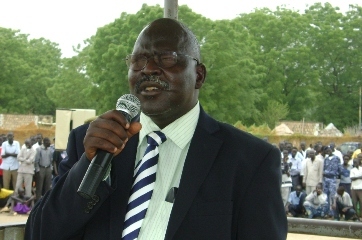Residents of Jonglei state’s Khorfulus call for peaceful dialogue with Athor
July 6, 2010 (JUBA) — Fearing of possible heavy fighting in the area between the forces loyal to former SPLA General who turned rebel, George Athor Deng, and the SPLA forces, residents of Jonglei’s Khorfulus County have called on President Salva Kiir to consider peaceful dialogue with George Athor instead of military options.

Addressing the gathering, Kiir reportedly told the audience that the decision taken by Gen. Athor to rebel against the Government of Southern Sudan after losing the elections is unacceptable. “It was wrong for Athor to rebel against the government and went ahead to kill innocent people at Doleib Hill after learning that he had lost elections. This was a criminal act and he is a criminal and must be brought to justice” he said.
“Athor must face justice for crimes he has committed against innocent people,” he said, warning those who lost elections not to resort to violence as a way of addressing their grievances.
“I personally talked to Gen. Athor on the phone and told him not to rebel against the government but instead seek legal avenues to address his grievances. He didn’t listen instead he went ahead and attacked SPLA forces killing some of them. Now he must face justice for the crimes he committed against SPLA and civilians,” said President Kiir
In a letter of appeal seen by Sudan Tribune with “title an honest call on President Kiir for peaceful dialogue with Athor by Khorfulus youth group”, noted that thousands of residents in the area have been trapped in their homes since April. “Our people have been confined. They witnessed no free movement in the areas under the two forces since the start of armed confrontations in April. They all become victims of confrontations and arbitrary arrest for information, raised the appeal acknowledging capability of the SPLA to crash forces loyal to the renegade General,” it states.
“We sincerely call your attention for peaceful dialogue with General Athor as mean to resolve the differences not because we doubt capabilities of our army, but because of the consequences our people will face during armed confrontations,” emphasized the letter.
General Athor was one of the over 340 political contenders across the region who went to the April polls independently after failing to secure approval of their candidatures by the Southern Sudan ruling party, the Sudan People’s Liberation Movement.
After spread of speculations and media circulations of his defeat days before announcement of election results which finally came in favor of his main rival, incumbent Jonglei state governor Kuol Manyang Juuk, his loyalists in the army staged protest at Dolleib Hill.
Athor however denied to have any connection with the group and described it as a clash within the southern army.
He declined calls to return to the regional capital of Juba amid repeated clashes between SPLA and forces loyal to him, trapping residents in their homes, with some unable to pay much attention to their fields. The military confrontations also rendered areas under Athor inaccessible to those who could provide help to the affected families.
The vast majority are women, children and the elderly. They have little choice except to wait and hope that the violence subsides. Khorfulus and her surroundings has been a battleground between troops loyal to the General Athor which now controls much of the south and south west of the town.
Dhieu Minyang Jok, an intellectual from the area in Khartoum said there are homes where no one knows whether the residents are alive or dead; there is simply no way of knowing because no one is able to go there.
Jok called on the two forces to cease fighting and spare the population. “They stop any military option as attempt to resolving their differences so that our people pay attention to farming being main source of their income. They cannot cultivate when two armed forces are engaged in the fighting. They should at least allow them concentration as they seek peaceful dialogue to settle their differences,” he said.
He said he has got a high number of reports of killing and assaults on civilians in the area and that the coping mechanisms of the people remaining in the area too seemed to be exhausted, with more and more women and children becoming the victims.
“The population was frightened by the violence affecting everybody living in the area but they still keep hoping that one day the fighting will end,” he said.
Many of those trapped in the area and cannot afford to leave, are either too poor, too weak or both who want to remain in their ancestral lands and not knowing where to go as they are too afraid to leave their homes.
(ST)
